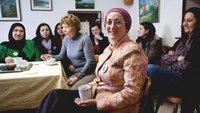Medica Zenica: 20 years supporting survivors of sexualised wartime violence
Dear Sabiha Husić: 20 years of Medica Zenica – What has your organisation achieved?
After the war ended, a few women found the courage needed to report openly about their experiences. Monika Hauser, the founder of Medica Zenica, recognised the needs these women had and supported them with medical, psychosocial and material assistance. With this, she was one of the very few who did anything at all for these women. In its post-war condition, the Bosnian state was neither able nor willing to help or deal with the extreme difficulties of the situation these affected women were in. In the last 20 years, Medica Zenica has been able to support thousands of these women, providing a safe place for them to be able to redevelop self-confidence and hope for the future. But we still have a lot to do. Even today, the majority of the survivors have still not received any support.
How has your work changed in the last two decades?
Today we are working together more with state institutions, ministries and other NGOs. That is not always easy. The problems faced by these women are not a priority for many. The victims believe that the Bosnian state has forgotten them and only organisations like Medica Zenica are interested in their difficulties. And it has to be said, this is generally the case. Time and time again we have to reprimand the government, reminding them of their responsibility towards survivors.
Where do you see the greatest challenges in the future?
Even today, there are still no therapy centres for women who were tortured during the war. The funds for organisations offering counselling - and Medica Zenica is one of the leaders in Bosnia in this field - are getting scarcer. The government does not want to accept that this work costs money and that they have to provide funding for it. Another important aspect is the need for more appreciation for women who are prepared to be witnesses during rape cases in court. For example, they need adequate advice and support during the whole process of investigation as well as the court case.
Bosnia is the first country in the world to grant the status of 'war victim' to survivors of sexualised violence.
Yes, that is true. Since 2006, the Bosnian state recognises survivors of sexualised violence as 'war invalids', which includes a small monthly pension payment, among other things. However, this law only applies in the Federation of Bosnia and Herzegovina: one part of Bosnia. This is not enough. It has to apply to women in the whole country. And the application process needs to be changed. Women are still being subjected to degrading experiences when they reveal their fate to the authorities.
Photos (from top to bottom):
© Christel Becker-Rau
© Cornelia Suhan/medica mondiale
Interview: appeared in memo 1-2013




